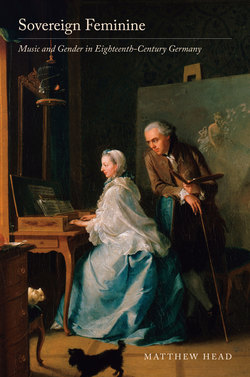Sovereign Feminine

Реклама. ООО «ЛитРес», ИНН: 7719571260.
Оглавление
Matthew Head. Sovereign Feminine
Отрывок из книги
THE AHMANSON FOUNDATION has endowed this imprint to honor the memory of FRANKLIN D. MURPHY who for half a century served arts and letters, beauty and learning, in equal measure by shaping with a brilliant devotion those institutions upon which they rely.
The publisher also gratefully acknowledges the generous contributions to this book provided by the Hibberd Endowment and the Manfred Bukofzer Endowment of the American Musicological Society.
.....
Forkel’s posthumous canonization as one of the first German musicologists could mislead modern readers into thinking that his views in the 1770s were more representative and influential than in fact they were. Musicology has been kind to Forkel because he wrote the first full-length biography of J.S. Bach (published in 1802) and one of the first histories of music in German.19 For these achievements alone he features prominently in studies of Bach reception, accounts of the development of German musical nationalism, and musicology’s construction of its past. This is not to deny all currency in the 1770s to his notion of music’s decline and loss of manliness. A conventional historiography was at work here, a well-worn inheritance from classical antiquity that pitted a manly past against an effeminate present. Such terms were often employed by German critics in the second half of the century, both before and after Forkel’s famous preface.20 In the 1752 edition of J.S. Bach’s Die Kunst der Fuge Marpurg lamented that the “manly character” of music, exemplified by Bach’s fugal counterpoint, had given way to “womanish song.” The popularity of lighter styles (which Marpurg also called the “galant”) is attributed “to the tender ears of our time,” an admission, perhaps, that the manly, as Marpurg understood it, had lost ground.21 In an oft-cited review from 1766, of a set of six symphonies by Giovanni Gabriel Meder, Johann Adam Hiller took exception to the inclusion of “Frenchified” and courtly minuets. In symphonic contexts, he asserted, such dances “always seem to us like beauty spots on the face of a man: they give the music a foppish appearance, and weaken the manly impression made by the uninterrupted sequence of three well-matched, serious movements.”22 Subsequent critics reported that Teutonic musical seriousness was under siege not so much from French habits as from the incursions of Italian comic opera into instrumental music. Christian Friedrich Daniel Schubart, for example, assuming the role of a military general, ordered that “since the comic taste has caused so much devastation among us, our first endeavor must be to confine this taste as much as possible and make room once more for the serious, heroic, and tragic, for pathos and the sublime.”23 By the end of the century, and particularly in centennial retrospectives of German music, the conceit of German manliness was fused with (elusive and exclusive) notions of the musically “true,” ideas of progress, and the canonization of Bach as a law giver and musical patriarch. In these developments from around 1800, and particularly in Forkel’s Bach biography, John Deathridge has discovered “the first real step towards the fake Teutonic musical universalism first promoted in the middle of the nineteenth century.”24
EXEMPLARY WOMEN IN THE FORKEL–REICHARDT CONTROVERSY
.....